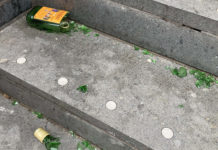
FIRST came the smoking ban; now the lowering of the drink drive limit is dealing another blow to pubs and hotels, which are once again having to adjust to suddenly altered trading conditions.
Already, one major pub group, Greene King, has reported that, while sales were up overall across the UK, they were lower in Scotland as drivers fought shy of being caught out by the lowering of the legal limit to 50mg of alcohol in the blood, down from 80mg.
Paul Waterson, chief executive of the Scottish Licensed Trade Association, has warned that the new legislation, which came into effect on December 5, 2014, will be a game-changer, with a greater impact than the smoking ban.
He has said that one of the major issues is that drivers are no longer sure how much they could drink the night before and still get behind the wheel safely the next day. This is stopping them drinking completely.
The biggest impact will be on edge-of-town and rural pubs and restaurants, and licensed business are going to have to up their game with varied and interesting soft drink options as well as a greater range of zero and low-alcohol beers and wines.
The new law is one of many changes affecting the hospitality industry this year.
The old ‘wet’ pub model is fast giving way to hybrid leisure outlets committed to the three Fs: families, food and fresh air.
The demand for drinks and meals in a pleasant outdoor environment has never been greater.
Well-travelled, cosmopolitan customers are more discerning than ever and have high expectations. Seasonal produce, local foods and healthy options are all moving up the menu, as are craft beers and restaurant- quality wines.
‘Wet’ pubs, if they want to survive in the new environment, will have to evolve. Places such as Garvie’s in Milngavie and the soon-to-be-opened Howwood Inn are showing the way with all day service – from morning coffees for school-run mums to the last darts player’s beer.


Pubco disposals could create opportunities for sitting tenants to buy and lenders are looking kindly on operators with good track records.
A move back to owner-managed businesses would be an excellent development for the sector.
After the long lean years of recession, consumers have cash in their pockets again and discretionary spending is on the rise.
But the downturn has taught them to be canny and leisure operators will have to get up early to attract them to their premises.
Voucher schemes – Groupon, Itison and 5pm – are now part of the landscape, for better or worse. Yes, they can increase footfall, but at what cost to margins?
Businesses have to use them as smartly as their customers – attracting people at quiet periods or limiting really stand-out offers. There certainly is no percentage in offering them across the board at peak periods.
Competition from cheap, VAT-free supermarket ‘dine-in’ deals is not going away, so leisure operators will have to concentrate on adding value to the dining out ‘experience’.
Wages and costs will stay up and margins will continue to be squeezed.
But improvements are the key.
Driving sales and trimming costs will improve profits and, in turn, demand for properties.
This demand will lead to more transactions, more confidence and more investment in the sector, ultimately leading to what everyone wants – improved prices and values.
• Alan Gordon is a partner at DM Hall Chartered Surveyors.
























